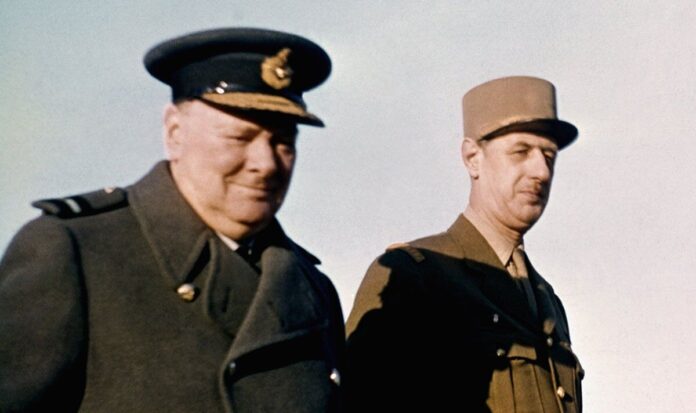Winston Churchill: A look inside wartime bedroom Britain and France have come within inches of creating dual empires throughout history. Being so close together and so powerful, leaders of both nations have hatched plans to solidify their power and help defend each other in times of crisis. While none has ever been seen through, one stands out more than most and came as war descended on Europe. On June 16, 1940, Nazi Germany was moving ever closer to crushing France. British Prime Minister Winston Churchill and French Undersecretary of Defence Charles de Gaulle met in London. Winston Churchill and Charles de Gaulle hatched the plan to create a Franco-British Union Lunching at the glitzy Carlton Club just off Green Park, the pair agreed that a Franco-British Union was needed to fend off the Nazis and secure safety in Europe. Two weeks before, British and French troops had been pushed off the beaches of Dunkirk in one of the closest and most desperate fights lost by the Allies. Churchill and de Gaulle drew up a document that would see the two countries merge and later met with his War Cabinet to consider the union document. The final “Declaration of Union, approved by the British War Cabinet, stated that: “France and Great Britain shall no longer be two nations, but one Franco-British Union. The constitution of the Union will provide for joint organs of defence, foreign, financial and economic policies. Every citizen of France will enjoy immediately citizenship of Great Britain, every British subject will become a citizen of France.” It would’ve seen hundreds of years of constitutional history immediately swept away, with joint controls of defence, foreign policy, finance, and economic policy. A scene from the Battle of Dunkirk where allied forces were evacuated to safety Britain and France’s parliaments would’ve been united, with French representatives likely sitting in the House of Commons in London. “We had before us the bridge to a new world, the first elements of European or even World Federation,” Churchill’s private secretary said. France was at the time locked in a difficult position. With the Nazis encroaching on French lands, whispers of an armistice were being passed around by politicians in Paris. By June 14, German troops had entered Paris, and two days later, they had almost overrun the country. While French Prime Minister Paul Reynaud was initially won around by the idea, soon, he began to doubt it. Many French politicians argued it was a plan by Britain simply to snatch France’s many colonies abroad. SUBSCRIBE Invalid email We use your sign-up to provide content in ways you’ve consented to and to improve our understanding of you. This may include adverts from us and 3rd parties based on our understanding. You can unsubscribe at any time. More info Churchill, de Gaulle, Franklin D Roosevelt, and general Henri Honore Giraud, 1943 One said that “be[ing] a Nazi province” was preferable to becoming a British dominion. Philipe Petain, who led a pro-armistice group and later became leader of the Nazi client state of Vichy France, described the proposed union as a “fusion with a corpse”. It became too much for Reynaud who soon resigned, and when Petain formed a new government the same evening, France immediately asked Germany to enter a truce. Within 48 hours of the document being drawn up, Churchill called off a visit to Concarneau in northern France and cancelled the union plans, and the Franco-British Union was soon forgotten. It wasn’t the last time Britain and France had proposed a union between their nations, however. Trending
Winston Churchill’s WW2 plan to make Britain and France one country
Sourceexpress.co.uk
RELATED ARTICLES


